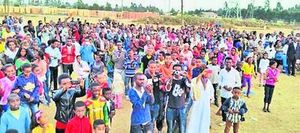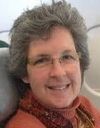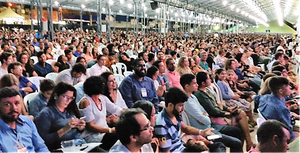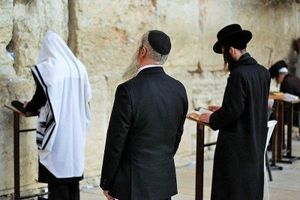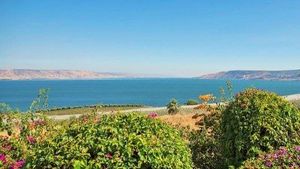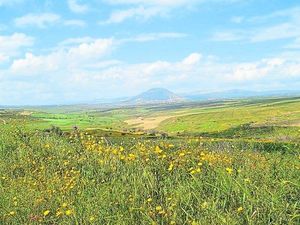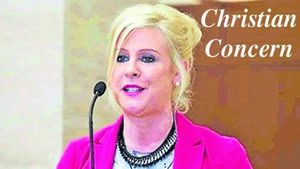From 5-13 January 2015, Dr Joel Beeke ministered in Ethiopia. This account is written by his wife, Mary.
On Monday 5 January, we woke up at 3.00am for our 5.25 flight to Chicago, but our departure was moved to 7.00am. The pilot finally arrived at 7.30am, so we didn’t leave until 8.15am. Consequently, we missed our connection to Washington DC, went standby on the next flight, but missed our Ethiopia flight. We then re-routed through Frankfurt, Germany, so that we could arrive in Ethiopia on Tuesday evening (15 hours later than expected), rather than Wednesday morning when my husband was scheduled to preach his first sermon.
Providential meeting
As we relaxed over lunch in DC, we chatted with a middle-aged man named Jim at the next table. ‘Where are you headed?’ ‘Ethiopia’. ‘Purpose?’ ‘Conference for ministers’. He told us later that because we were going to a place not associated with vacation, and because we seemed relaxed about our delays (we had worked through our frustration earlier), he asked his next question: ‘Can you explain predestination to me? And do we have a free will?’
Joel eagerly explained with Scripture and diagrams. Jim grew up Roman Catholic, but said it never did anything for him. He was repulsed by scandals in the church. But his interest and curiosity about God has been growing. He doesn’t have a Bible, but when he rides his Harley in the wild hills of Texas, he has experienced the beauty and presence of God. He doesn’t want to bother God or take up too much of God’s time by praying too much to him. And he doesn’t feel right just asking for things from God without giving back in return. He ventured a logical, fatalistic attitude: ‘If God knows whom he chooses, then what difference does it make if I seek him?’ Yet he is searching for God.
When Joel explained praying by ACTS (adoration, confession, thanksgiving, supplication), he said, ‘I have experienced adoration and confession; that is very helpful’. We encouraged him to pray without ceasing, that God has time for him and millions of others 24/7, because of his gracious and omnipotent nature. We explained God’s secret will and revealed will and encouraged him with God’s invitation to repent and believe, and to come unto him by the power of the Holy Spirit. He had tears in his eyes and wondered aloud if this meeting was planned by God. We believe it was.
Joel encouraged Jim to email him with questions and promised to send him the new Reformation Heritage KJV study Bible and several other books. Joel prayed with him and we walked away greatly encouraged, thanking God for this opportunity to share his goodness. Then, too, I noticed a few others listening in to our conversation in the cramped quarters of the restaurant. So maybe other seed was sown as well!
Ethiopia and Anteneh
On to Frankfurt, Germany, an overnight trip. I slept some; Joel, not so much. After a three-hour layover, we were off to Addis Ababa, the capital of Ethiopia, with a stop in Jeddah, the capital of Saudi Arabia.
We were pleasantly surprised to be bumped up to business class! We were waited on hand and foot with elegant food, and seats that reclined fully. This was one time in my life that I wished the flight was longer! It took a long time to get out of the airport — health scan, purchase visas, wait for luggage, find Anteneh. Anteneh is a Puritan Reformed Theological Seminary grad who still lives in Grand Rapids and is working on his doctorate at Southern Seminary. He invited us and arranged our trip. A generous donor paid for the expenses of ministers travelling to the conference.
Ethiopia is an emerging country. It is the birthplace of coffee, which is still a main export, along with livestock and water. The 94 million people are 65 per cent Christian, 33 per cent Muslim, and 2 per cent no religion. They have got along peacefully together for a long time. There is beginning to be some external influence to agitate the Muslims to become more conservative and work against Christians.
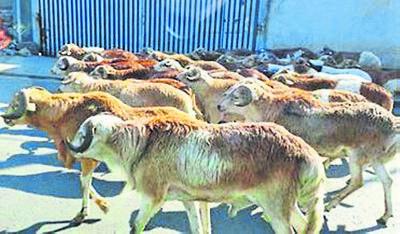
Ethiopia’s military is strong, and terrorists are imprisoned or executed. The people are very warm and friendly and affectionate. Marriage is esteemed highly and homosexuality is illegal.
Our hotel was right next to a hilltop Ethiopian Orthodox church, and the priests were chanting/singing over a powerful loudspeaker until 3.30am. Believe me, it was not a lullaby! Ethiopia celebrates Christmas on 7 January, so Joel preached to about 400 people on the shepherds announcing the birth of Jesus. How fitting that on the way to church we passed a number of shepherds herding their sheep to market, for families to buy one to slaughter for Christmas dinner. The church is more than 50 years old and has started 15 daughter churches. Some of the old elders were the founders: kind, wise, and dignified men.
Anteneh said the streets were quite empty compared to a normal day, though I thought they were teeming with people. It is a family day, when many go to church.
City and Christmas
Addis Ababa, population nearly 4 million, is not an international city. We saw thousands of people today, and only five white folks besides those in the mirror. It is a city in transition. There are many shanty towns — houses made of sheets of aluminum and scrap materials, along dirt pathways. Yet high rises, highways and railways are replacing them. The infrastructure is improving, but things like internet, phone service and utilities are works in progress.
China is funding many projects. They see great potential in the country because of possible oil and mineral resources. They employ hundreds of thousands of Ethiopians, since labour is cheap. The Ethiopians like Chinese involvement more than American, because the Americans criticise some things about the country and the Chinese remain silent.
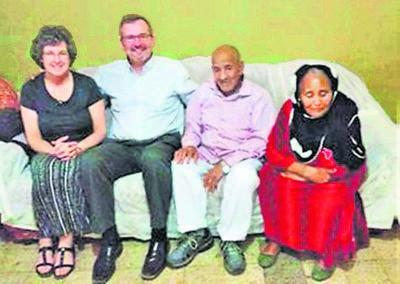
After lunch, we headed 65 miles away to Nazareth for Christmas dinner with Anteneh’s in-laws. Once outside the city, the scenery was open and beautiful: mountains — mostly brown because it is dry season, but with trees dotted on the landscape and some canyons (nap-time on the way). It was the old father’s 95th birthday that day. His wife is 73 and she wasn’t feeling so well. We asked them if they loved the Lord. She replied: ‘He’s our only hope and our only Father’. They have been married 55 years, and had twelve children, eight still living.
Two daughters worked hard to serve the meal: ‘hospitality bread’, ‘injera’ — a tortilla-like bread made from a grain named tef, with different types of stew or meat. We had lamb, and chicken with a spicy sauce. It was different but tasty. They had a ‘coffee ceremony’, which they do up to three times a day. They spread grass on the floor, build a fire on a little charcoal burner, roast wild coffee beans, let everybody smell them, grind them, heat the water on the charcoal, wash the cups, pour the water over the beans, serve and drink the coffee.
One of their daughters lives in her own little house on the property, takes care of her parents, and runs a small business. She showed us her two cows that she milks in order to sell the milk and cheese. Her ex-husband was present. He is intelligent, has an advanced college education, and could have been an ambassador to Egypt, but chose to waste his life on alcohol and drugs instead. He is homeless.
Anteneh strongly admonished and evangelised him. He resisted at first, but Anteneh pressed him for his soul’s sake. He finally said he would acquiesce to God. Anteneh prayed with him. We continue to pray that this is a real and dramatic change in his life.
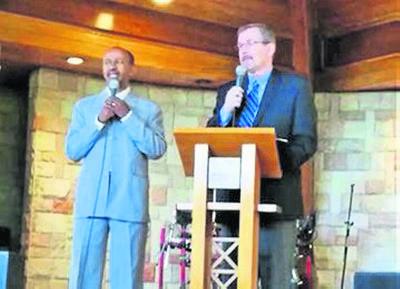
Conference and friendship
The ministers’ conference took place Thursday and Friday. Joel’s addresses were on ‘The work of the pastor’, ‘The life of the pastor’, ‘The leadership of Jesus Christ’, ‘The ethics of leadership’ and ‘The test of leadership’. Anteneh spoke on ‘The growth of the Ethiopian church’, ‘The Great Commission’ and ‘How to spread the gospel throughout Ethiopia’. Joel’s interpreter was Mihret (meaning ‘mercy’). The language barrier is partially overcome with the interpretation. Some of the men knew some English, but we still feel bad for our limited ability to converse with them.
One thing that was apparent, though, was their affection and warmth. They greet each other with a handshake, either touch shoulders or go cheek-to-cheek, and kiss the air or kiss the cheek, right, left, right, and then another handshake. If they are really close and haven’t seen each other for a long time, they hug for a little while. All the while, they are laughing and talking. Even for us, they gave a reserved version of these greetings.
It is common to see men walking down the street holding hands or one with his arm around the other. It is a brotherly/friendly thing, absolutely no link to homosexuality.
After giving four addresses the first day, Joel was exhausted. A quick supper at an imitation Starbucks, a bit of emailing and off to bed. At 2.00am we were rudely awakened by the off-tune droning of the Orthodox priest again. He continued the rest of the night, with only a few 15-minute breaks. Happily, Anteneh found us a quieter hotel for the following nights.
Debre Zeit
Pastor Bezabeh picked us up Saturday morning to take us to Debre Zeit. In the nine years he has been at his church, they have purchased land in a poor rural area and built a church, a K-12 school that has 600 students, a Bible school and health clinic. Their people walk to church. They receive most of their support from Northern Ireland.
Joel preached on the Canaanitish woman and they responded warmly. They kindly put us up at a nice resort that also hosts missionaries. It was wonderful to relax and eat our meals lakeside. Even though Ethiopia is near the equator, it is a comfortable 75 degrees year around, due to the elevation.
Sunday morning dawned cloudy — unusual for Ethiopia in January. Joel preached on ‘Running the race’ from Hebrews 12. Two young teen boys were very affected by the sermon and expressed a desire to live for Jesus Christ by the power of the Holy Spirit. Pray for lasting fruits.
Ethiopians are event- and people-oriented, whereas Americans are more time-oriented. So, as we relaxed over lunch, time ticked away, and the event of open-air preaching 1.5 hours away came closer. Transportation was hastily arranged and we were on our way. We would have been only a little late, but as we got on the ring-road around Addis, the car stalled. Anteneh got it started again, but for the next hour, we limped along, stalling 30 to 40 times. Sometimes he got it started by popping the clutch, sometimes by starting it and revving the engine. We think it was overheated, because it didn’t have the problem after the outdoor service. Or maybe Satan didn’t want us to go there.
It was scary being stalled on a highway. We prayed a lot. Fortunately they don’t go too fast and are used to going around obstacles. God protected us.
Trusting God
As the sun was setting and the air was cooling, Joel preached in the open air to 700 people on ‘For me to live is Christ, and to die is gain’. They listened well. Pray with us that eternity will reveal fruits.
Back to the city. People walk everywhere, thousands of them. Even at night, with dark clothes, they walk in the road. It is a constant braiding of cars, taxis and people. They just adjust moment by moment and go around each other. A quick beep means, ‘I’m coming through!’ It’s as though the people cross roads ‘by faith’, lane by lane, as opposed to planning for the whole way across before setting out. They trust the drivers, they trust they will make it to the other side. And I hope they trust God!
Mihret met us on the way, and brought us to his house for an Ethiopian supper. His wife, Bekelech, had prepared a feast. He had earlier told us their courtship story. They had both decided to give their whole life to the Lord and not get married, because they were so on fire for him. But God brought them together in a wonderful way.
Winging our way home on Monday, we were thankful for safety, prayerful for blessing, and enriched by our experience with the Ethiopian people. Maybe we should live life a little bit more like the way they cross the road, still planning ahead like we do, but stepping out in faith, trusting (and loving) others and God. And trusting we will make it safely to the other side.

